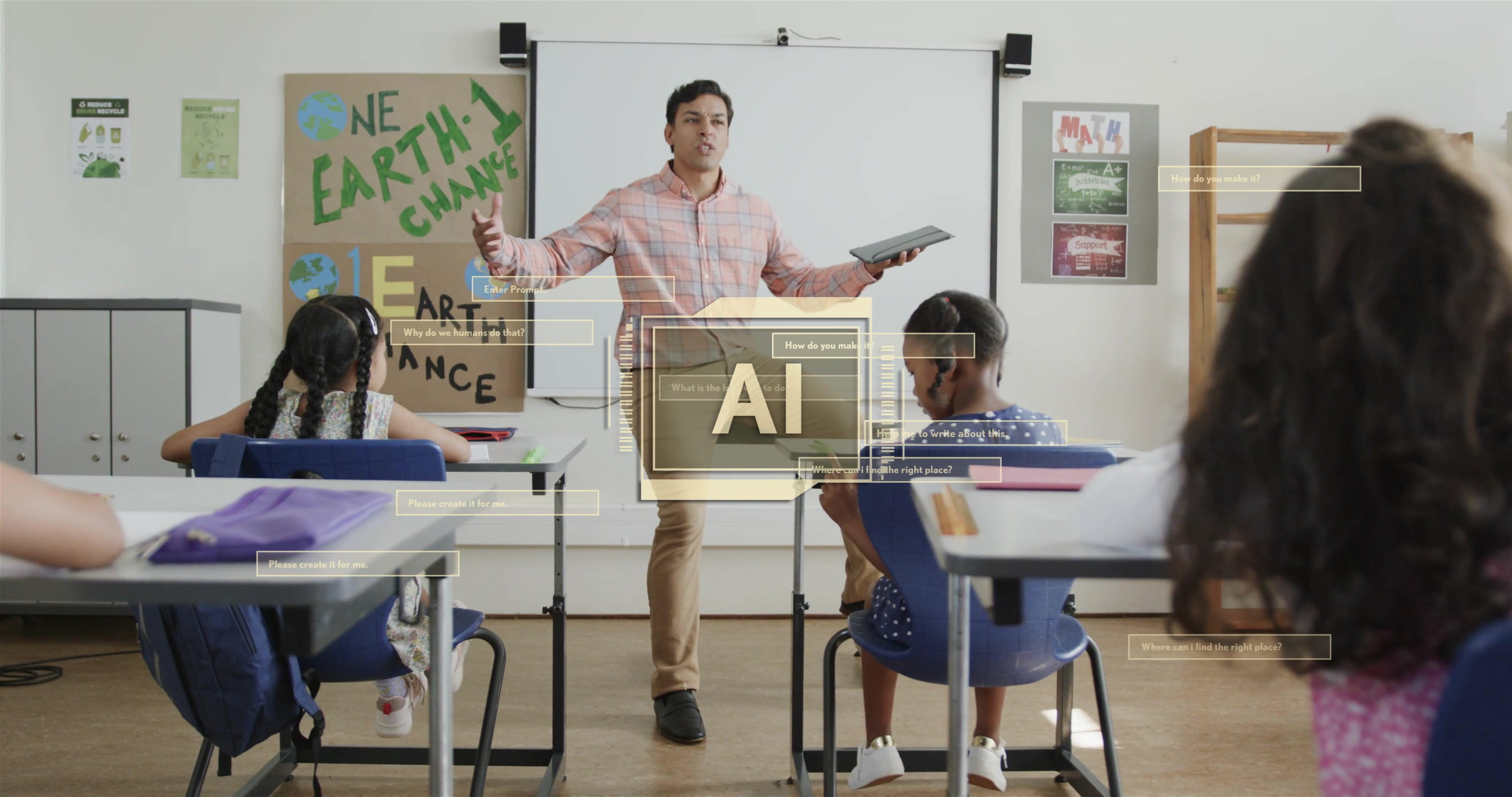article Article Summary
Oct 03, 2025
Generative AI tools like ChatGPT significantly enhance students' higher-order thinking skills with large positive effects, contradicting concerns about potential cognitive harm.
Generative AI tools like ChatGPT significantly enhance students' higher-order thinking skills with large positive effects contradicting concerns about potential cognitive harm Objective The main goal of this study was to systematically examine the impact of generative artificial intelligence Gen-AI particularly ChatGPT on students' higher-order thinking HOT skills through a comprehensive... continue
article Article Summary
Oct 02, 2025
K-12 teachers worldwide experience varying levels of "cultural distance" when using GenAI tools, ranging from seamless alignment in communication tasks to complete breakdown when local languages and cultural contexts are absent from training data, reveali
K- teachers worldwide experience varying levels of cultural distance when using GenAI tools ranging from seamless alignment in communication tasks to complete breakdown when local languages and cultural contexts are absent from training data revealing how global AI defaults systematically favor dominant cultures over marginalized educational communities Objective This study... continue
article Article Summary
Oct 01, 2025
K-12 teachers worldwide actively use GenAI education as a double-edged tool to reduce existing educational inequalities while preventing new ones, but their equality-oriented efforts are consistently constrained by infrastructural gaps, insufficient train
K- teachers worldwide actively use GenAI education as a double-edged tool to reduce existing educational inequalities while preventing new ones but their equality-oriented efforts are consistently constrained by infrastructural gaps insufficient training and restrictive social norms that require systemic support to overcome Objective This study examined how K- teachers across... continue
article Article Summary
Sep 30, 2025
Female secondary school students consistently demonstrate lower AI learning attitudes, literacy, and career interest than males, but AI literacy serves as the crucial bridge connecting positive learning attitudes to career aspirations regardless of gender
Female secondary school students consistently demonstrate lower AI learning attitudes literacy and career interest than males but AI literacy serves as the crucial bridge connecting positive learning attitudes to career aspirations regardless of gender Objective This study aimed to investigate the relationships between secondary school students' AI learning attitude AI... continue
article Article Summary
Sep 29, 2025
GenAI is transforming K-12 classrooms by creating a new collaborative division of labor where teachers evolve from knowledge transmitters to instructional decision-makers and ethical guides while AI handles routine tasks.
GenAI is transforming K- classrooms by creating a new collaborative division of labor where teachers evolve from knowledge transmitters to instructional decision-makers and ethical guides while AI handles routine tasks Objective This systematic review aimed to examine how Generative Artificial Intelligence GenAI reconfigures teachers' instructional work in K- classrooms and... continue
article Article Summary
Sep 19, 2025
Secondary school students' conceptions of learning AI range from basic awareness and knowledge acquisition to sophisticated views involving ethical considerations and transformative intellectual development, with most students demonstrating positive attit
Secondary school students' conceptions of learning AI range from basic awareness and knowledge acquisition to sophisticated views involving ethical considerations and transformative intellectual development with most students demonstrating positive attitudes but fewer reaching advanced competency levels Objective The main goal of this phenomenographic study was to investigate secondary school students'... continue
article Article Summary
Sep 18, 2025
Using AI-driven adaptive learning platforms in elementary education significantly improves both student academic performance and engagement levels across K-5 classrooms.
Using AI-driven adaptive learning platforms in elementary education significantly improves both student academic performance and engagement levels across K- classrooms Objective The main goal of this study was to investigate the impact of AI-driven personalized learning systems on academic performance and student engagement among K- students in elementary education settings... continue
article Article Summary
Sep 16, 2025
AI technologies in educational big data analytics demonstrate high predictive accuracy and effectiveness in personalizing learning, but face significant technical, institutional, and ethical barriers that limit widespread implementation.
AI technologies in educational big data analytics demonstrate high predictive accuracy and effectiveness in personalizing learning but face significant technical institutional and ethical barriers that limit widespread implementation Objective The main goal of this systematic review was to comprehensively analyze recent research - on the deployment of artificial intelligence in... continue
article Article Summary
Sep 15, 2025
This collection demonstrates that AI in education requires careful human-centered implementation that preserves authentic learning experiences while leveraging technology's potential to enhance rather than replace meaningful teaching and learning.
This collection demonstrates that AI in education requires careful human-centered implementation that preserves authentic learning experiences while leveraging technology's potential to enhance rather than replace meaningful teaching and learning Objective The main goal of this collection was to examine the integration of artificial intelligence in K- and postsecondary education through... continue
article Article Summary
Sep 14, 2025
This paper argues that prompt engineering should be established as a foundational 21st-century literacy in K-12 education, with students learning to critically and creatively interact with AI tools through structured curriculum design and comprehensive as
This paper argues that prompt engineering should be established as a foundational st-century literacy in K- education with students learning to critically and creatively interact with AI tools through structured curriculum design and comprehensive assessment frameworks Objective The main goal of this study was to propose a comprehensive framework for... continue
article Article Summary
Sep 13, 2025
Elementary students using a reflection-enhanced generative AI system significantly outperformed their peers in both science learning achievement and computational thinking skills development.
Elementary students using a reflection-enhanced generative AI system significantly outperformed their peers in both science learning achievement and computational thinking skills development Objective This study aimed to investigate the effectiveness of a Causal Explanation and Reflection CER model-based generative AI learning system in cultivating elementary school students' computational thinking core... continue
article Article Summary
Sep 12, 2025
AI-driven virtual reality shows significant promise for enhancing STEM identity and social-emotional skills development in K-12 students through immersive, personalized learning experiences and safe practice environments.
AI-driven virtual reality shows significant promise for enhancing STEM identity and social-emotional skills development in K- students through immersive personalized learning experiences and safe practice environments Objective The main goal of this review paper was to explore the current applications benefits challenges and future prospects of AI-powered virtual reality VR... continue